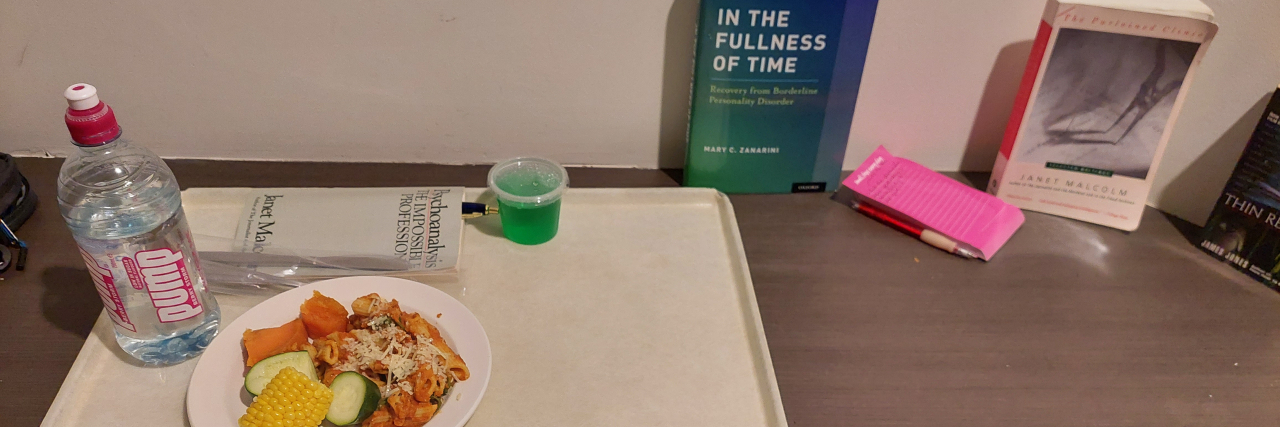Borderline Personality Disorder Stigma in Treatment Is Particularly Harmful
When I was in hospital for three weeks this year mainly on account of my borderline personality disorder (BPD) being unable to cope with two relationship fractures, I witnessed the stigma that affects people with my disorder, especially in such a setting.
There was a patient with borderline personality disorder in the hospital with me who was clearly not well and tended to dominate the groups she was in, making it difficult to learn the skill that was being taught. On the first day she arrived I tried to help her out and gave her an orientation to our unit because she looked highly agitated and scared. Later that same day I went through a break up and needed space away from others because I was heartbroken. This patient interpreted my distance as a rejection and it was my turn to experience what it is like being on the receiving end of a split (idealization to devaluation).
I felt attacked while at the end of my tether, so I went to the weekend nurse for some support. This is how our exchange went:
Me: “I don’t want to complain. I don’t want anyone to speak to her about me. She needs to be here.”
Nurse: “Yes I often tell patients that this is an opportunity to work on their own assertiveness dealing with other patients.”
Me: “Yes but I’m not well enough myself, too broken-hearted right now to deal with her devaluation of me.”
Nurse: “I don’t know if you know, Andrew, personality disorders are the most difficult to treat.”
Me: “Yes I know because I have one too.”
Nurse: (a pause) “But you’re not the same as them. They haven’t been validated when they were growing up.”
Me: “Neither was I.”
Nurse: (Another pause) “Well as you would know from your own experience…”
Here was the old, calcified BPD stigma again that I hadn’t experienced for many years! The stigma was twofold both against the patient I was having difficulties with and also that I “wasn’t the same as them.” Actually it was threefold because it also contained the disproven idea that people with BPD or other personality disorders are difficult to treat (which I was too shocked to correct with the nurse) when many longitudinal BPD studies bear this as false.
More stigma was to come when I went down to the dining hall and met up with the other patients I had become friendly with. The subject of this polarizing patient with borderline personality disorder came up again after she had had an enraged meltdown earlier that day because she missed the cut off for a group activity. This was “classic borderline” behavior two hospital friends said to me. Before this time I had tolerated even sometimes (shamefully) participated somewhat in comments against this patient. This time I woke up to myself and countered;
“There is no typical or classic borderline,” I said to them both. “The manipulative and narcissistic and attention-seeking you mention are not diagnostic criteria. Thinking this ruins it for people like me. This is personal. This is why I wasn’t diagnosed for so long and went without the proper treatment because I didn’t fit this stigmatized view.”
One friend apologized while the other said he was only saying it to stir me and also he was entitled to his opinion.
I replied, “your opinion and experience are yours of course, but if you stereotype and stigmatize my mental illness, then it is personal. I could easily do this with your mental illness. I could also equate you with difficult, risky and relationally damaging behavior.”
My friend seemed to retreat and the topic was changed. I later sent them the article I was in shortly after my diagnosis about BPD and stigma, the one in which I described being told that I was “too nice to be borderline.”
As I left hospital I said a warm goodbye to my fellow borderline personality disorder friend on the receiving end of this stigma. She apologized and explained that she couldn’t read my change from being helpful to being distant. I explained back that my heart was broken outside of her and I only want her to be well. Later I thought I probably should have apologized too.
I was disappointed by the nurse and my friends but also in myself; I could have handled the stigma better by confronting it earlier rather than being a complicit bystander. Had I betrayed my fellow borderlines despite knowing the intensity of the emotions and the woundedness at the core that must have been at play?
My disappointment at myself notwithstanding, I can be proud that in one nurse’s eyes I showed that people with personality disorders can be so much more than the most difficult, the most untreatable. And with my friends I hope they know that assuming any mental illness is “classic” is nothing but an ugly stereotype. The reality is great pain, and if we are in hospital we have a desire to get better and to fight for another day.
That’s also a lesson for me.

